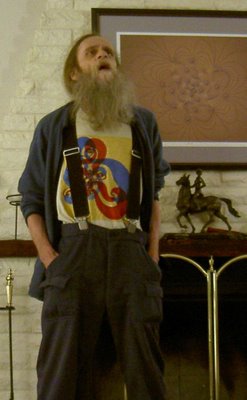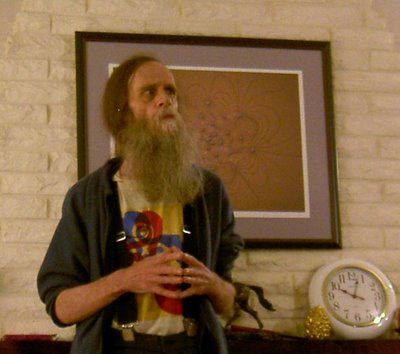Rationality and Intelligence
 by Martin Hunt - copyright 2006 - All Rights Reserved
by Martin Hunt - copyright 2006 - All Rights Reserved
This article was included in the 37th issue of the Philosopher's Carnival.
One of the disconcerting things about science is that time and again the world is revealed to be not what we thought. The ancients did their best to account for the world that they saw. But their state of ignorance was such that many explanations (often conflicting) could account for what they knew. As knowledge is gained then the range of acceptable explanations diminishes. As we learn more, whole paradigms are shown to be invalid. This is an unpleasant outcome for the people who are committed to the invalid paradigms. They are faced with the necessity of abandoning a world view and adopting another. This is much more difficult than admitting error. When the world view is old, backed by tradition and community, then the transition to the new view is very difficult.

"The Robot's Rebellion" by Keith Stanovich is a book that proposes a very interesting and satisfying answer to the ancient puzzle; "How can a person (or anything for that matter) be 'free'?" A key concept in the Robot's Rebellion is the idea that comes from Richard Dawkins' book 'The Selfish Gene'. Dawkins' theme is that in biology the thing that replicates from generation to generation is genetic structure. The expression of the genetic structure - plants and animals - are not replicators. They are vehicles that carry the real replicators into the future.
Dawkins' idea is one of these disconcerting changes in perspective that I mentioned at the start of this essay. Previously it was assumed that the purpose of genes was to enable creatures to replicate. In the new view creatures exist to enable genes to replicate.
An important idea that came to us from the Greeks is that things have immaterial essences that determine their nature. Plato developed ideas about 'ideal form' - an immaterial template to which all actual examples conform. He figured that there was an 'ideal horse'; a perfect, but immaterial horse; and that all real horses were more or less flawed examples of that ideal horse. For Plato this wasn't just a verbal shorthand. He argued that the ideal horse was more real than the actual horses. Related to the idea of essence is the idea of spirit. Spirits were seen as the things that animate matter. Matter without spirit was just stuff - inanimate lumps. Matter with spirit was active - it moved around, did things, had intentions and desires.
At the time that these sorts of ideas were invented they represented an advance in understanding. It was an idea that was in accord with experience that enabled more and more experience to be understood - and even a flawed understanding is better than no understanding.
I think that ideas like 'soul' and 'mind' are associated with these Platonic understandings. A mind, or a soul, is seen as an immaterial entity that exists inside us and that controls or 'drives' the body. Basically, in the ancient conception, a mind drives a body the way that a person drives a car.
The problem with these ancient concepts is that they just don't accord to present knowledge. Hundreds of years of looking have never revealed anything like a soul or a mind. Moreover, contemporary science has found that there is no way for an immaterial mind to interact with a body - it violates fundamental principles like the conservation of matter and energy.
This is the context of 'Robot's Rebellion'. Stanovich is not concerned with interpreting the world in terms of the ancient concepts. The closest he comes to that is when, at the start of the book, he discusses how it is religious people who most vividly feel the incompatibility betweene the ancient and the new ways of thinking about what we are. What Stanovich is concerned with is laying out a more adequate structure for understanding.
He accepts the metaphor of the body as a vehicle - but he throws away the driver. Instead of having a driver, the vehicle is a robot charged with the task of figuring out _on_its_own_ how to get its passengers to their destination. The passengers are of course the replicators - the genes, and whatever replicators may be going along for the ride.
There are robots and robots. Some robots are directly programmed so that each stimulus has a preordained response. Such robots work pretty well in fixed environments like car assembly lines but don't work very well in an unstructured environment
Say you were taking an interstellar journey that would last several lifetimes where you would be placed in some sort of suspended animation until you arrived at your goal. Would you trust your fate to a hardwired robot of the assembly line type? Probably not - though it might work. What I would want is a robot that can figure out on its own how to satisfy my requirements. This is the sort of robot that people are - we are robots designed by evolution to figure out on its own how to satisfy the requirements of its passengers - genes. The genes have a bit of a problem - how to keep the robot loyal? Basically, Stanovich's idea is that people are robots that can be disloyal to their masters - Rebellious Robots.
How could disloyalty come about? How can anything like a vehicle gain autonomy? Autonomy is different from freedom. Freedom means causeless effects. Putting aside the question of whether causeless effects are even possible I ask instead - would you want your actions to be uncaused? Would you trust yourself to walk down a street knowing that you might, as a bus approached, leap in front of it - for no reason at all? That's the sort of thing that freedom implies.
Evolution is a process that causes the best replicators to populate the future. Could genes alone have produced autonomous vehicles? It is hard to see how. Even if genes had foresight, and wanted their vehicles to be autonomous - its hard to imagine how they would do it. And, it must be acknowledged, genes have no foresight.
This is a problem that is quite general. For instance, any king with an ambassador faces the problem of the rebellious robot. Kings have been able to deal with this problem with various degrees of success. Kings tend to be very smart. How can a gene, which isn't smart at all, cope with this problem? Genes have an strategy not based on the mind - they either replicate or they don't - genes don't care one way or another. But with variation, genes can explore a huge possibility space, and in time can stumble upon all sorts of unlikely solutions.
How is it that a robot can rebel? This is possible if the capabilities built into it enable developments that the builders could not foresee. It was Dawkins, again in 'The Selfish Gene', who suggested a way that this could happen. He proposed that genes aren't the only possible replicators. The new replicator that he described depends on the capacity for imitation. Imitation is very similar to replication. With genetics, genes are replicated. With imitation, behaviour is replicated. Dawkins wondered whether there were circumstances where imitation would support the evolutionary algorithm - as genetic replication does. It turns out that imitation would indeed support an evolutionary algorithm.
Dawkins proposed, and Susan Blackmore and others have elaborated on this idea. The replicating ideas are called memes, and the study of the implications of memes is called memetics. The presence of memes in a brain means that a body is host to two independent sets of replicators - genes and memes. Genes evolve to produce creatures. Memes evolve to produce minds, and language, and culture. A creature with a mind is responding to two necessities - genetic necessities and memetic necessities.
A mind like ours needs to be both intelligent and rational. Rationality allows the construction and manipulation of fairly abstract mental structures. Intelligence determines the scope and effectiveness of mental structures and also the speed of their creation.
In an autonomous robot there are many systems that behave automatically, beyond both the robot's direct control. These systems are very useful, and essential for autonomy - but they aren't themselves autonomous. Low level systems like perception are among this collection of automatic systems. So are mid-level systems that generate our thoughts and utterance. And higher level automatic systems might create capacities like intelligence and creativity. At the very top of this hierarchy is consciousness.
It is easy to be very mysterious about consciousness, but this doesn't get us anywhere. Let us accept a non-mysterious concept of consciousness and work from there. Consciousness is an ability that rests on a lower ability - the ability to generate a narrative. A narrative is a description of a sequence of events. A particular kind of narrative presents the events as a causal chain - these are explanations. Consciousness, I suggest, is a particular kind of explanatory narrative - its a narrative that tells the creature what is going on around it. An extension of consciousness is self-awareness - the creature is aware of its own role in the narrative that it is both generating and listening to.
Memes are of crucial importance for narratives. All but the simplest narratives depend on words, and words depend on memes. A simple narrative that doesn't need words might be seen when a creature does something with unpleasant consequences. The non-verbal narrative might be expressed in words as "ooo! - bad outcome! - avoid this kind of situation!" A higher level narrative is when a creature produces the narrative upon observing another creature. A higher level narrative is when a creature can imagine itself in a situation and what would happen.
Now all of this narrative creation can be completely automatic. But it enables a surprising and new thing. It allows competing narratives to be created, and behaviour can be caused by the interpretation and evaluation of those competing narratives. When behaviour is determined by evaluation of circumstances - then behaviour is autonomous. I think that this is the source of autonomy in the world.
Let us note the source of the autonomy. It is not something created by genes. Nor is it something created by memes. It is something that is created by an environment where genes and memes are co-creating a creature. The capacities that genes and memes build into their creatures surprisingly merge in a way that enables the creature to transcend their creators.
That we can transcend the interests of creators and pursue goals of our own is the surprising outcome or the co-evolution of genes and memes. All of our mental capacities are important in this. BUT - (big but) - rationality is key. The reason for this is that it is rationality that produces reliable descriptions of the way that reality may evolve from the present - either into the future or into the past. There are other ways (irrational) of producing such descriptions - but such descriptions are not found to be reliable.
We thus come to a crucial distinction between intelligence and rationality. Intelligence makes us better or worse at attaining our goals - whatever those goals might be. Intelligence, per se, doesn't provide guidance about what the goals should be. Rationality does, potentially, have the ability to evaluate goals. Rationality allows us to step back and ask "Do I want to do this?"
For a hundred years our culture has been obsessive about the value of intelligence and has been more or less disrespectful towards rationality. We have very smart people working towards bad goals. This is not a desired outcome. Better, I suggest, to focus our attention on rationality.
This blog is called Reason and Rhyme. Let us cherish both. Reason is rationality - the capacity we have for making sense of the world. Rhyme is for our other essential capacities - intelligence, creativity, sensitivity - that makes living fun.
Both are pretty important.













1 comment:
delightful.
Post a Comment